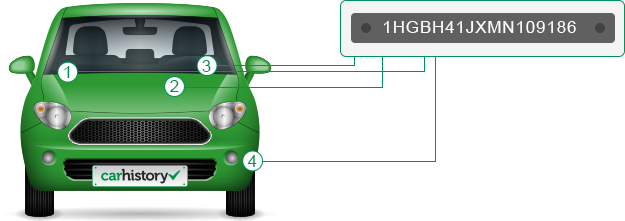
The vehicle identification number (VIN) is composed of 17 characters (digits and capital letters) that act as a unique identifier for the vehicle. A VIN displays the car's unique features, specifications and manufacturer.
The VIN can be found in a couple of places including on the car's registration label (1), on the compliance plate in the engine bay (2) or on the passenger side windshield (3), or on one of the door posts (where the door latches when it is closed) (4). See the image below:
Sydney, Australia, Tuesday, 24 May 2016: Almost a quarter of used cars on the market that underwent a vehicle history check in 2015 were revealed to be hiding a potentially serious issue, according to an analysis of 154,035 reports[1] from CarHistory.com.au, Australia’s first online automotive bureau, an Equifax Company.
A significant 22.2% of used cars that underwent a CarHistory vehicle check last year received a negative report, illustrating that tens of thousands of Australians were at risk of buying an encumbered vehicle or a lemon and finding themselves out of pocket to the tune of about $3,000 in repairs.
Up to 1.2 million Australians are set to buy a used car in the next 12 months[2], yet CarHistory’s research found that fewer than one in two understands the need to do anything beyond a basic mechanical check before making a purchase.
CarHistory research showed only one in four (28%) recent used car buyers undertook a mechanical check before purchasing their new vehicle, and less than half considered checking for issues such as past accidents, finance owing, or fraudulent incidents including flood damage, re-birthing and odometer wind-backs.
Izzy Silva, Equifax Australia General Manager, Consumer, said the prospect of buying a second hand car was daunting for many people, and with good reason.
“CarHistory’s research revealed that very few people feel truly confident when buying a used car. In fact, only 29% of buyers said they are very confident about the process,” Mr Silva said.
“Relevant vehicle checks can help give people peace of mind and bolster their confidence when buying a used car. However, most people don’t consider what can go wrong beyond mechanical issues, leaving themselves at risk of being sold a lemon,” he said.
In 2015, 12.8% of used cars on the market had an encumbrance (money owed on the vehicle) making this the most common pitfall picked up by CarHistory. In addition, one in 10 cars (9.3%) checked by CarHistory in 2015 had previously been written off.
“No matter how genuine the seller seems, it’s important to know all you can about your car’s past to make an educated decision about whether it’s a smart buy,” Mr Silva said.
“Australians spend on average $13,000-$14,000 buying a used car, and an average of 13 hours on the researching, checking and buying process.2
“In comparison, the average out of pocket cost of a bad used car purchase is $2,000-$3,000. This equates to 20% of the average purchase amount – a high price to pay, and often one that could have been avoided by checking the vehicle’s history,” he added.
The lack of thorough vehicle history checks is putting used car buyers at risk of being duped by sellers who either knowingly or unwittingly do not disclose the truth about the car’s history.
Mr Silva said the lack of awareness amongst consumers of more in-depth vehicle history checks was leaving people out of pocket and potentially putting their safety at risk.
“We know from our research that many private used car sellers have, at some stage, sold a car they knew had a potential issue, some of them serious.
“While two-thirds (67%) of Aussies want to know their prospective new car’s history before purchasing, only one in three (32%) are aware that they can undertake a CarHistory or vehicle history check,” Mr Silva said.
“Instead of relying solely on the opinion of a friend or family member, we encourage people to dig a little deeper and use a service like CarHistory to get more information about a car’s potential pitfalls – like finance owing, write-offs and odometer wind-backs – before signing on the dotted line.
Mr Silva added, “A car is a big purchase, and one that people want to get right the first time. In terms of financial investment, lost time and personal wellbeing, it’s better to be safe than sorry.”
Consumers can get a CarHistory report for $39.95 in just seconds.
[1] CarHistory Data 2015. National analysis of 154,035 car reports ordered by consumers in all Australian states and territories.
[2] CarHistory Used Car Survey 2016. The Leading Edge. March 2016. n = 807 Australian used car buyers aged 18-75 years.